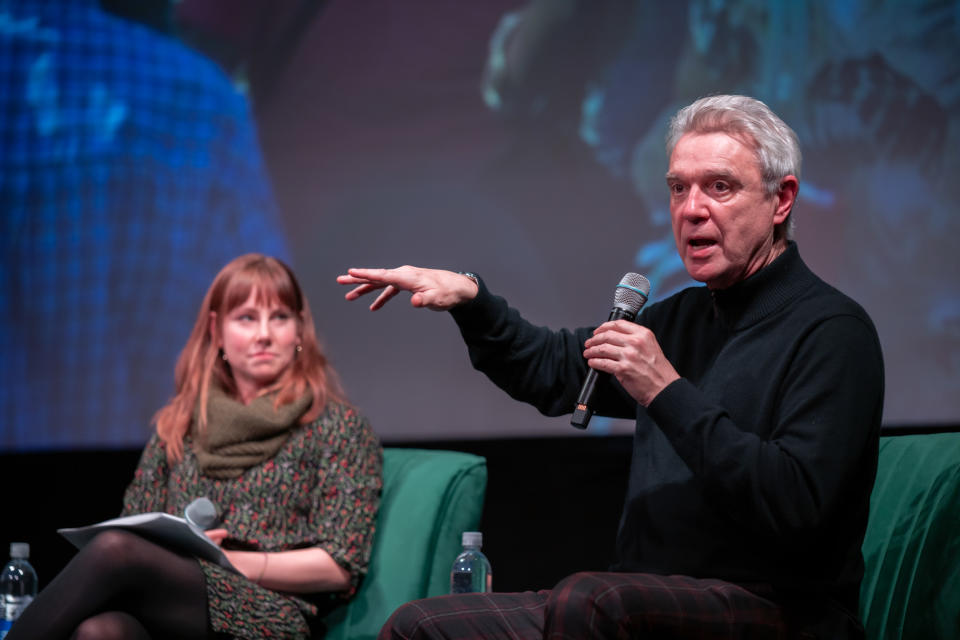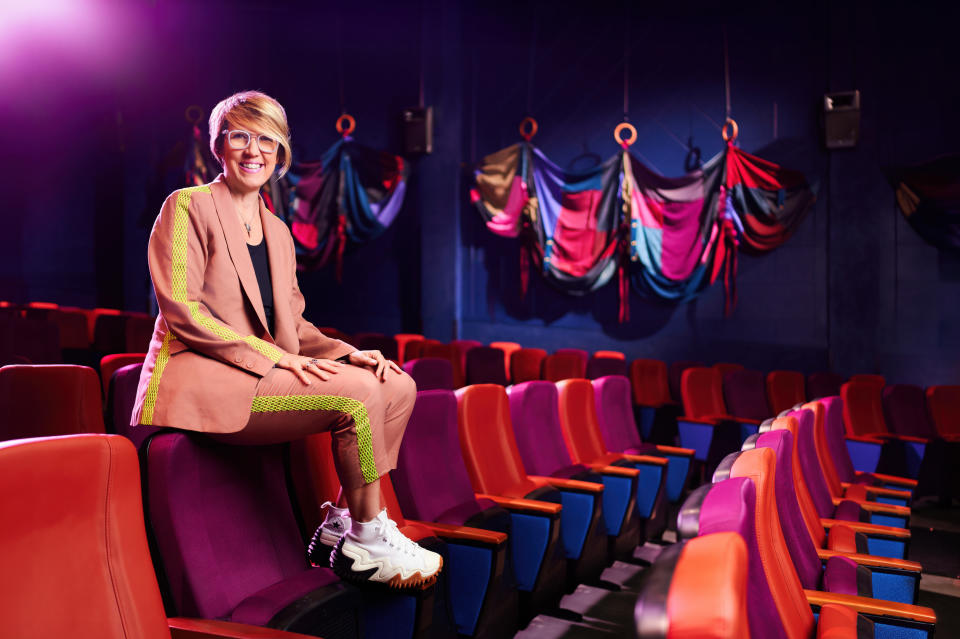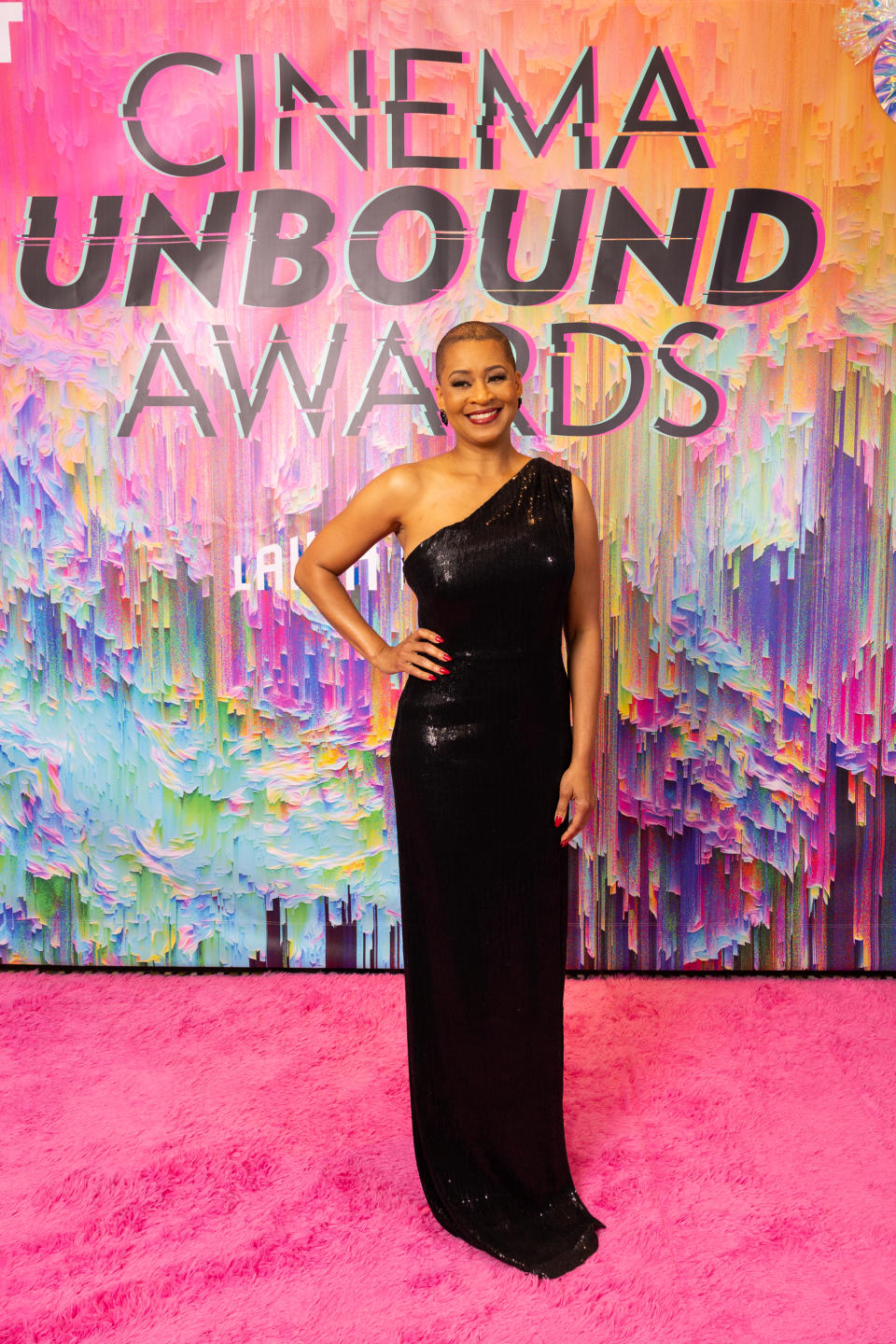Portland’s New Tomorrow Theater Attracts David Byrne, Ruth E. Carter With ‘Carte Blanche’ Series

A 300-seat theater on Southeast Division Street in Portland with a curious past is giving notable talents such as David Byrne and Ruth E. Carter a new stage on which to tell their stories: the Tomorrow Theater. The venue, which is part of the Portland Art Museum’s film-and-new-media Center for an Untold Tomorrow (PAM CUT), features a cinema and creative hub aimed at challenging conventional forms of storytelling, providing a platform for artists to connect with audiences in fresh ways.
About a year ago, when the project was in its early stages, Amy Dotson, director of PAM CUT and inaugural curator of film and new media at the Portland Art Museum, says she began to sense a trend from multimedia artists within her community — they no longer wanted to be siloed into one role such as filmmaker, podcaster or animator. The solution to this could be the development of a new venue, where artistic lines blur and creators expand upon their talents and skills. A creative, community and event space, the Tomorrow Theater was born to foster cinema, art and multimedia storytelling.
More from The Hollywood Reporter
“For cultural snackers, the programming is designed to inspire and surprise audiences and artists who are not content to be contained to a single medium, label or art form,” says Dotson, an accomplished independent film producer. She previously headed programming for the Independent Film Project and managed the talent and juries for the Gotham Awards.
Experiences at the theater fall into a multitude of categories, including Arthouse Cinema, with aart-making events inspired by beloved movies and performances; its Carte Blanche series, in which artists and polymaths are given free rein to stir up the muses in interdisciplinary ways; and The Intersection, reviving contemporary vaudevillian medleys of cinematic experiences that feature performance, new media arts, immersive arts, technology, music and audio storytelling.
In November 2023, David Byrne opened the Tomorrow Theater and the Carte Blanche series with an interactive and live presentation of Reasons to be Cheerful, his nonprofit online magazine that focuses on cultivating curiosity to make the world a better place and encourages impact on a global scale.

“When we think about polymath, which is really just a fancy word for completely multifaceted humans and artists, the first person that came to mind was David Byrne. He’s somebody that’s in every medium: theater, film, music, art, journalism. He is somebody that even when times are tough, is trying to find the good and trying to find those out there who are doing things differently,” Dotson says. “We were all very inspired by how much he truly values innovation and thoughtfulness around the importance of the arts and community.”
Through the daily stories they publish, Byrne says that he and his editorial staff are finding a surprising number of reasons to be cheerful “despite everything that we hear when we pick up the paper or look at our news feeds.” Byrne has personally authored articles on the eradication of gerrymandering in Michigan, overfishing, student debt and eliminating child poverty.
When given the Tomorrow Theater megaphone, Byrne decided he wanted to talk about affordable housing, bringing with him two panelists who have been successful in changing zoning regulations in both Portland and Montana.
“I knew that Portland was developing a new kind of contemporary arts hub,” Byrne tells The Hollywood Reporter. “Portland’s been going through a tough time, so it’s exciting they are initiating a new theater. Affordable housing doesn’t have to do with the performing arts directly, but it does have to do with artists being able to afford to live somewhere.”
After the talk, Byrne screened American Utopia, his film with Spike Lee. “It’s a concert, but it’s also show and tell, where we show you there are Reasons to be Cheerful — people working, playing and creating together while we talk about various issues.”
Carte Blanche’s second guest, Academy Award-winning costume designer Ruth E. Carter (Black Panther, Do the Right Thing) appeared at Tomorrow Theater ahead of Oscars weekend, reflecting on her career as an artist — from Do the Right Thing to Black Panther. She also discussed her influences from Afrofuturism and her book The Art of Ruth Carter: Costuming Black History and the Afrofuture.
Carter made history as the first Black person to win the costume design category and earned Marvel Studios its first Oscar recognition. For Black Panther: Wakanda Forever, Carter made history, again, for her outstanding work and became the first Black woman to win multiple Academy Awards in any category.
The Tomorrow Theater’s structure itself is as unique as its content. It was previously known as the Oregon Theater, making it nearly 100 years old. The 9,000-square-foot building began as a vaudeville house in 1925 and was turned over several times as a Spanish-language, independent and X-rated theater. Portland-based interior design studio Osmose, headed by Andee Hess and Makrai Crecelius (clients include Salt and Straw and Portlandia’s Fred Armisen), gave the historic venue a new look, which includes a bold kaleidoscopic color palette with repurposed bowls used as lighting in the lobby and ruched curtains made by the Portland Garment Factory covering the walls inside. The first indicator that this isn’t your typical performing arts space is the metallic silver mattress sculpture suspended from the entryway, an homage to its former life as a “mattress-and-couch-only establishment,” Dotson says. The yellow hallway, which leads upstairs, is called “I Am Curious (Yellow),” she reveals, named after the movie that flipped the theater from arthouse to X-rated.

“We embraced all those lives and spirits. It’s one of those theaters people walked by for a long time and said, ‘Wow, I can only imagine what it looks like inside.’ When we got in and saw it had amazing bones, quite literally — the original 100-year-old beams were uncovered under lots of lots of different layers — I thought there was a world of possibility,” Dotson says. “It was like a fantasy HGTV project that we took down to the studs, then turned it over to the designers. They all got to tell their stories through the materials and the colors. We wanted to be modern and a little punk.”
It’s part Pee Wee’s Playhouse with splashes of Vivienne Westwood and CBGB — and thoroughly Portland. Programming within can be characterized as “cinema unbound,” achieved through a mix of artist-driven screenings, performances and discussions. A flexible place and space where art forms and multi-interest audiences collide with local and global artists across many disciplines including poetry and spoken word, music, performance, dance, culinary arts and more to create a unique experience each night.
“The floors aren’t polished and the doorknobs are gritty. We want artists to feel like if they’re bringing their work in, whether it’s on the screen or whether it’s something for the wall or the floor, that this feels like a space where you can be creative and collaborative,” Dotson says.
Touching all the senses, the Tomorrow Theater’s culinary program is led by Leather Storrs (former chef-owner of Noble Rot), who creates menus according to themes, artists and vibes of the featured screenings, events and experiences.
The theater’s creative program advisory council includes Savina Neirotti (Venice Biennale Cinema), Liz Mowe (Kickstarter), Thomas Gewecke (former chief digital officer, Warner Bros.), Aimee Lynn Barneberg & Nico Fearn (Nike), producer David Cress (Portlandia), Rosemary Colliver (ShadowMachine) and Julie La’Bassiere (publicity and awards strategist, AppleTV+), among others.
Other programming includes interactive screenings and performances in tribute to an iconic actor, singer, performer or director; one-night-only live podcasts and broadcasts; takeover nights by artists, curators and partners; first-run films, previews of new series, podcasts, games or test-driving new cinema tech; costume nights, dance lessons and visual enhancements; bands, artists and performers stopping by to share the art and films that inspire them; and unorthodox docs that play with the boundaries of form, function, style and story, with cosplay.
In June, PAM CUT will present the fifth annual Cinema Unbound Awards, recognizing creatives who “push the boundaries of cinema and expand its dimensions as an art form.” Last year’s honorees included Armisen, Guillermo del Toro, Tessa Thompson, Gregory Gourdet (three-time James Beard semifinalist chef), Jon Raymond (Emmy-nominated screenwriter and novelist) and Jacqueline Stewart (Academy Museum of Motion Pictures director-president).
Currently, the Portland Art Museum sees more than 350,000 visitors annually and is undergoing an expansion and renovation project — known as the Mark Rothko Pavilion — which will add 95,000 square feet. Rothko spent his childhood in Portland and had his first museum showing at PAM.
Additional reporting by Melissa Gill

Best of The Hollywood Reporter

 Yahoo News
Yahoo News 
